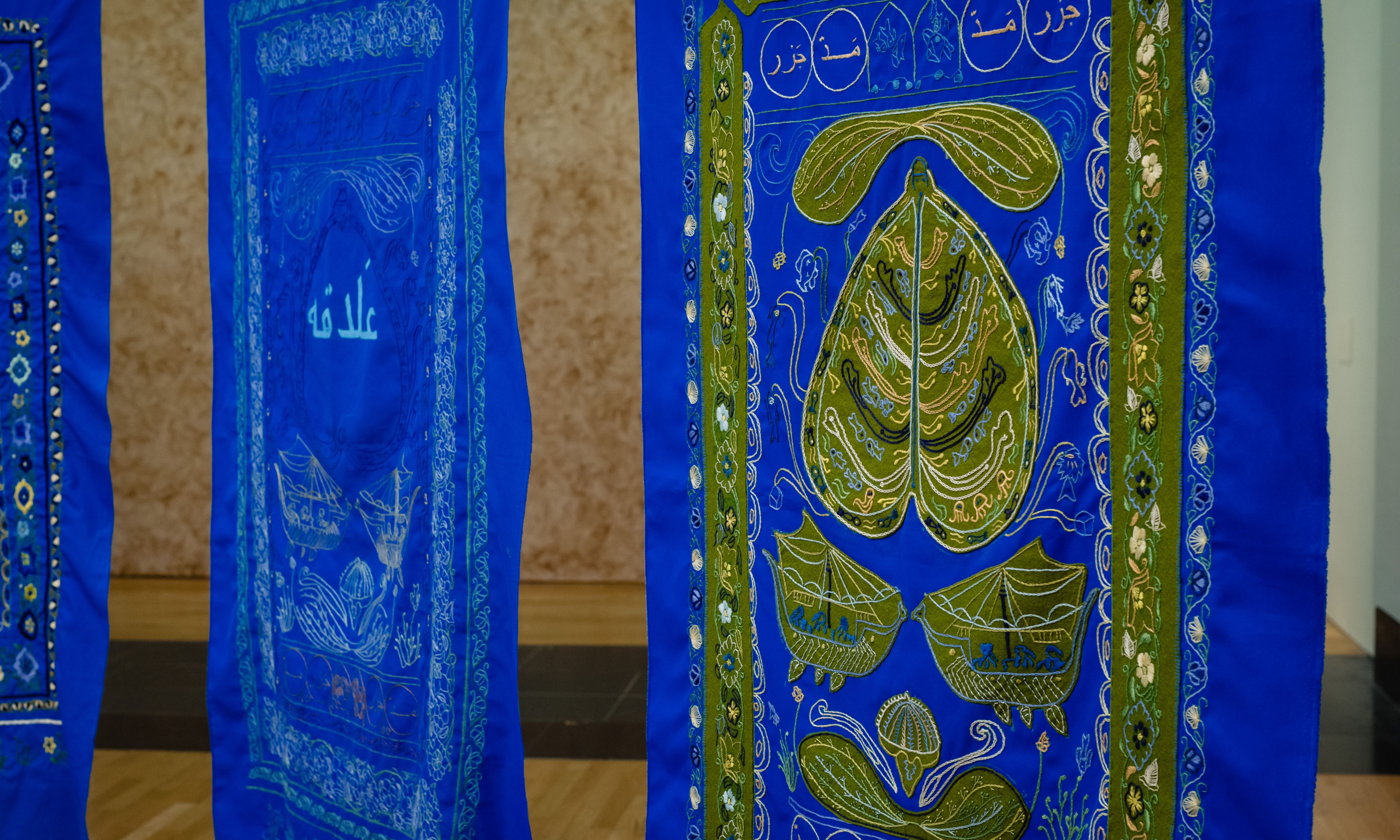Detail of Mounira Al Solh's A night hour, as long as night (2023), National Museum Cardiff
Photo: Polly Thomas
Artists selected for this year’s Artes Mundi award—the largest art prize in the UK with a jackpot of £40,000—have revealed pertinent installations reflecting their personal experiences in the Middle East. At the National Museum Cardiff, three artists—Rushdi Anwar of Kurdistan, Kuwaiti-born Alia Farid and Mounira Al Solh who lives and works in Lebanon and the Netherlands—present works that illuminate socio-political and ecological issues.
Artes Mundi has adopted a new exhibition format for its recently launched tenth edition, expanding across Wales to multiple venues (20 October-25 February 2024). In the Wales Art Review, the director of Artes Mundi, Nigel Prince, wrote: “To mark this 20th anniversary, we collaborate for the first time with five venues across Wales. That Artes Mundi should have a genuine Wales-wide presence was an ambition of our founding chair, William Wilkins."
Installation shot of Rushdi Anwar's work, National Museum Cardiff
Photo: Polly Thomas
All of the artists, shortlisted last year, have issued a statement on Instagram in the wake of the Israel-Hamas war, stating: “We call for an immediate end to the massacre before the humanity we believe in is turned into rubble.”
Anwar’s powerful installation links to Bashiqa, a town located in northeast Mosul. We have found in the ashes what we lost in the fire (2018) consists of 12 boxes containing burnt photographs showing a destroyed church Anwar visited in Bashiqa—a Christian community hub—bringing destruction and conflict to the fore.
Behind the boxes hang three pictures detailing the annihilation of the Al-Nabi Yunus Mosque by Isis in 2017. A series of photographs alongside, treated with soot (A Few Lines of History, 2011) evoke the seizure of the city of Halabja, Anwar’s hometown, during a chemical attack when thousands of civilians died, including several members of the artist’s family.
Alia Farid's In Lieu of What Is (2022), National Museum Cardiff
Photo: Polly Thomas
Meanwhile Farid’s vast sculptures shaped as water vessels—which address the “impact of extractive industries on the land, ecology and social fabric of southern Iraq and Kuwait”, according to a project statement—are a crowd-pleaser in Cardiff. “The jerry can sculpture [is a vessel that] was brought back from Saudi Arabia by my grandmother,” she says. The vessel was used to carry petrol and holy water. “It has an intersectional quality, speaking to the oil economy and religious tourism,” Farid adds.
Her accompanying film installation, entitled Chibayish (2022), is a moving exploration of “the history of water” at the confluence of the Tigris and Euphrates rivers.
Al Solh’s installation includes a series of drawings, I Strongly Believe in Our Right to be Frivolous (2012-ongoing) which documents encounters between the artist and Syrian refugees who were displaced to Lebanon. “It was important to draw portraits and write down conversations,” she said at the exhibition press briefing, stressing that the project had continued in Cardiff, where she also captured the city’s residents.
Her section also includes a tent-like sculpture, centred on patterns she drew, produced in collaboration with groups of Lebanese and Dutch women. According to Prince, these structures act as “breathing libraries [and] embrace the concept of defiance”. Al Solh writes on Instagram “Many thanks… to all women who helped me stitch those pieces.”
Detail of Naomi Rincón Gallardo's Red vulture I (from Verses of Filth), 2021-2023, Chapter
Photo: Polly Thomas
The other works, spread countrywide, give audiences a chance to see other contemporary names. The contemporary art gallery Mostyn in Llandudno presents, for instance, work by Taloi Havini of the Nakas tribe; her three-channel video work Habitat (2020) is a “visual composition of the experiences of Bougainvilleans with colonialism, mining, resistance and land and water protection, from the 1960s to the present day”, writes Wanda Nanibush, curator of Indigenous art at the Art Gallery of Ontario.
At Oriel Davies Gallery, Newtown, UK-born Carolina Caycedo is showing My Female Lineage of Environmental Struggle (2018), a banner depicting more than 100 environmentalists and activists. At Glynn Vivian Art Gallery in Swansea, the Vietnamese-born Nguyen Trinh Thi has re-created her sculptural and audiovisual piece evoking a shadowy forest, And They Die A Natural Death (2022), which was first seen at Documenta in Kassel last year.
Finally, Chapter in Cardiff presents three new video works by the Mexico-based artist Naomi Rincón Gallardo. “The trilogy imagines different iterations of tzitzimimes, who descend to earth and find themselves within a neocolonial necropolis in a moment of planetary cataclysm,” Gallardo told Art Review. The tzitzimimes are skeletal demons who appear in painted manuscripts from the sixteenth century in colonial Central Mexico.
Following an open call, the artists this year were chosen by a panel comprising Nanibush, Katya García-Antón (chief curator of the Office for Contemporary Art Norway, OCA), the Johannesburg-based artist Gabi Ngcobo and the curator and writer Zoe Butt. The Bagri Foundation, a UK charity, is supporting Artes Mundi 10. The winner will be announced in January.

